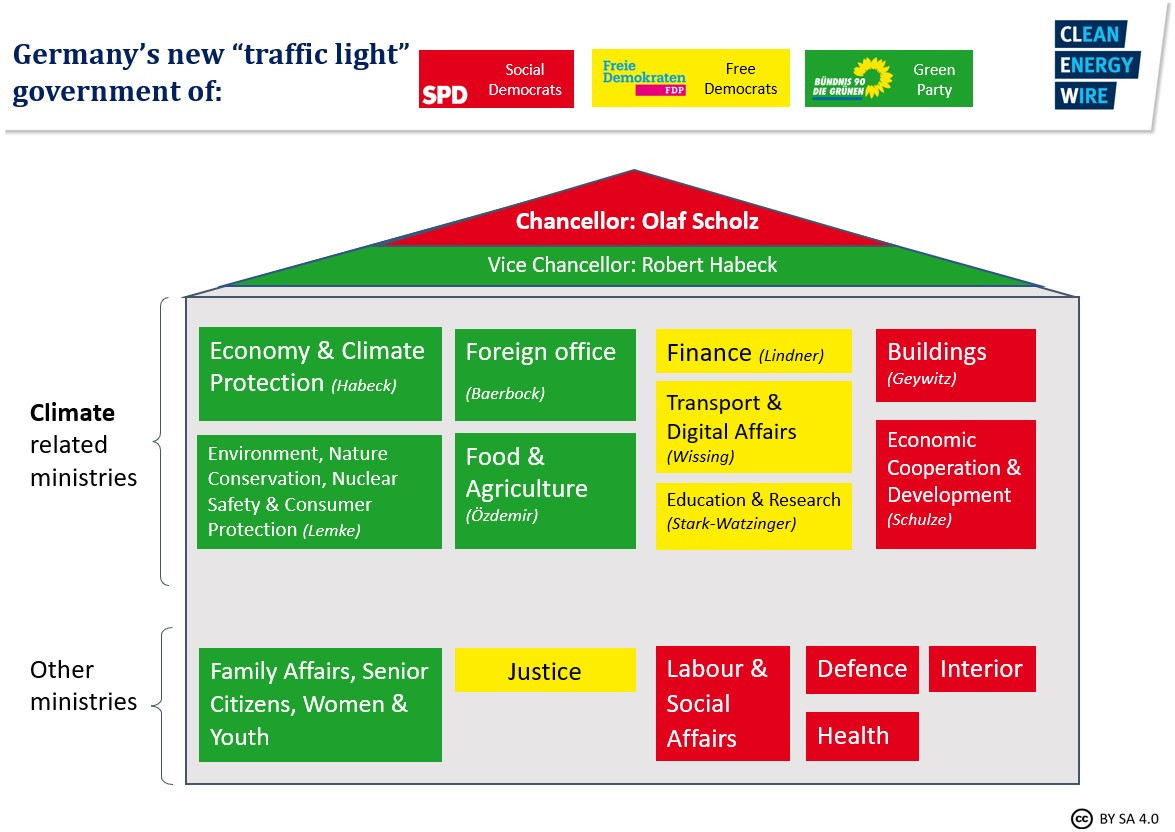New German government cabinet complete as parties greenlight coalition treaty
The formation of Germany’s new government has finished its final steps and is expected to be completed in as early as Wednesday (8 December). After the Social Democrats (SPD), the largest force in the new government coalition, decided at a party conference on the weekend to pass the coalition treaty with the Green Party and the pro-business Free Democrats (FDP), the last outstanding SPD ministers were announced on Monday. Former environment minister Svenja Schulze will head the Ministry for Economic Development and Cooperation (BMZ) and Klara Geywitz will take the novel buildings’ ministry. On Monday, the Green Party announced that 86 percent of party members participating in an online vote, approved the coalition treaty and the ministers proposed by the party leadership, clearing away the last hurdle for the future government coalition.
As head of Germany’s delegation to several international climate conferences, Schulze will now be in charge of a department where cooperation and aid projects are often concerned with both development and climate change adaptation and mitigation. "I have been committed in the last years to climate change and the transformation we are facing, and now it's international solidarity at the global level which I will be responsible for in the future,” she said at a press conference. “This is a great honour and I am very happy to be part of it.”
Climate action has emerged as a key field in development cooperation, with outgoing minister conservartive Gerd Müller (CSU) calling for turning the energy transition into a platform for economic assistance to Africa. Designated Green foreing minister Annalena Baerbock has said international cooperation to mitigate the effects of global warming will become a pillar of the new government's foreign policy.

Geywitz, who has not been particularly visible in national politics apart from when she stood (and failed) together with chancellor-elect Olaf Scholz to become party leaders in 2019, will be responsible for the newly created buildings ministry. The ministerial newcomer has her work cut out, as the coalition wants to increase the share of renewable energies in the heating sector, expand local heating networks and reach a share of 50 percent climate neutral heating by 2030 while incentivising the creation of new (climate neutral) homes and refurbishing the existing building stock.
Ministerial newcomer Geywitz faces challenge to reconcile climate measures with affordable housing
Previously part of the interior or environment ministry, the department will now stand on its own feet and faces the challenge of soaring rents in big cities and a building stock badly in need of decarbonisation if climate targets are to be met – all while Germany is experiencing severe labour shortages. "The task ahead of us is huge,” Geywitz said. “Building 100,000 new homes per year is a challenge in terms of planning but also for the construction industry, and in view of the climate goals we must also do this in a climate-friendly and energy-saving way.”
But apart from climate, the new SPD minister will also have to take care of social questions regarding affordable housing, one of her party's key election promises. Already plagued by rising costs for raw materials and labour shortages in construction, some observers fear more climate-related regulation in the buildings sector could push up housing costs further.
The building sector exceeded its 2020 Climate Action Law budget of 118 million tonnes CO2 equivalent by 2 million tonnes. German homes are a big hurdle on the path to greenhouse gas neutrality as they are responsible for around one-third of the country’s emissions. Nearly two-thirds are still heated with fossil fuels and most of them also need to be modernised for lower energy demand. The government aims to have a 'nearly' climate-neutral building stock by 2050 after emissions in the sector have stagnated for nearly a decade.
The new government's coalition treaty has stipulated ambitious emissions reduction steps in the building sector. These include a share of 65 percent renewables in new heating systems by 2025 and a 50 percent share of climate neutral heating by 2030. The coalition also plans to implement a digital "buildings resource passport" to achieve a circular economy in buildings and launch a national strategy for timber construction, lightweight construction and raw material security.

